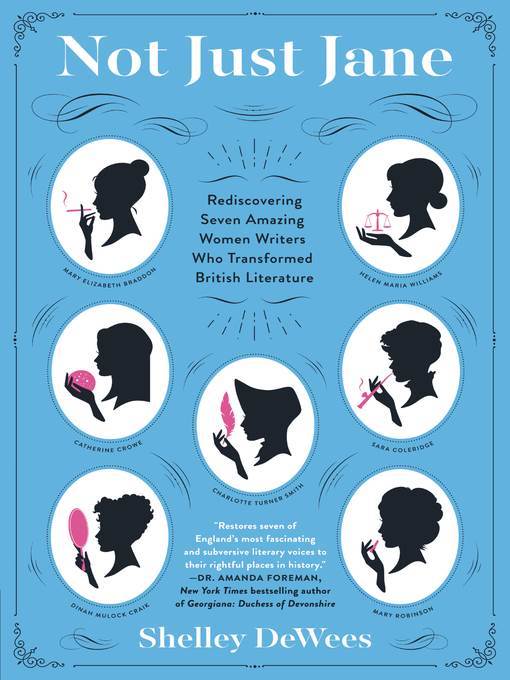
Not Just Jane
Rediscovering Seven Amazing Women Writers Who Transformed British Literature
- اطلاعات
- نقد و بررسی
- دیدگاه کاربران
نقد و بررسی

May 16, 2016
DeWees’s biographical assessment of seven English women authors of the 18th and 19th centuries marks an enthusiastic, if uneven, addition to the ongoing project of recovering “lost” women writers and addressing the gender imbalance in English literature. She profiles Charlotte Turner Smith, Helena Maria Williams, Mary Robinson, Catherine Crowe, Sara Coleridge (daughter of Samuel Taylor Coleridge), Dinah Mulcock Craik, and Mary Elizabeth Braddon. Their stories are complex, involving dissolute husbands, illness, opium, and the French Revolution. The best chapter belongs to Robinson, who had a lively career on the stage; gained the patronage of Georgiana, Duchess of Devonshire; and caught the eye of the Prince of Wales. DeWees can be almost too enthusiastic a tour guide, given to twee salutations to her “dear reader,” and her write-ups are light on substantive critique. Nonetheless, she does important work in challenging the notion of canon, pointing out that the advent of digital libraries has made many of these lesser-known works easily accessible. That accessibility, combined with the awareness spurred by books like DeWees’s, may be the best step of all toward redressing the literary canon’s historical imbalance. Agent: Noah Ballard, Curtis Brown.

September 15, 2016
Debut author DeWees brings back to life seven Victorian women writers with the hope of proving them worthy of shelf space alongside Austen and the Brontes.The British women of this book lived from the mid-1700s to the late 1800s, a time when society expected them to find husbands and not do much else. But these were no ordinary women; all had "broad disregard for convention...an unabashed sense of self-worth." Some wrote because their situations forced them to, after bad marriages left them unsupported (Charlotte Turner Smith). Others did it because they were compelled by their beliefs, whether political or personal, in protest against the negative connotations of "spinsterhood." Mary Elizabeth Braddon wrote in search of a successful career and, despite the rage of critics, made a fortune. Catherine Crowe penned one of the first detective novels complete with a "resourceful, industrious, lionhearted" female lead. Sara Coleridge wrote Phantasmion, considered by some as the first fairy-tale novel in English. What DeWees does best is reveal the interesting lives and strong characters of these oft-forgotten writers, proving to readers that there were many more successful Victorian women writers than the handful that populate syllabi. The most memorable chapters belong to Mary Robinson, who left a loveless marriage to become a commanding actress and mistress to the Prince of Wales, using her fame to become a definitive cultural voice of her time, and to Coleridge, whose gripping story reveals a constant struggle against the binding duties of motherhood and marriage. Virginia Woolf summed up Coleridge's tragedy well: "She meant to write her life. But she was interrupted." While some chapters blend together and the accomplishments become indistinguishable, this book succeeds at making readers aware of the gaps in our knowledge of British literature. Read this not as serious literary criticism but as an appreciation of writers who deserve to be remembered. If DeWees' goal is to encourage "a bookshelf full of new titles," she succeeds in planting the seed that there are many treasures out there waiting for a second chance.
COPYRIGHT(2016) Kirkus Reviews, ALL RIGHTS RESERVED.

June 1, 2016
First-time author DeWees here illuminates the stories of Charlotte Turner Smith, Helen Maria Williams, Mary Robinson, Catherine Crowe, Sara Coleridge, Dinah Mulock Craik, and Mary Elizabeth Braddon, so that these women can take their place alongside Jane Austen in readers' minds. DeWees positions herself as a fan of Austen, which lends a fun and breezy approach. For readers with a more academic bent, the use of "Jane" rather than "Austen" may seem reductive, and phrases such as "our forgotten ladies of literature," and their predecessors a "cadre of female scribblers," minimize decades of scholarship that has recuperated earlier women writers to their rightful status. Furthermore, DeWees suggests that women lacked a genre model and mentions the masculine picaresque style of Henry Fielding's Tom Jones yet neglects to discuss Samuel Richardson's Pamela, which indeed provided a template for women's domestic fiction. VERDICT Lovers of Austen's books and film adaptations of her work will find much to enjoy in this informative overview of authors in conversation with Austen. Unfortunately, DeWees misses an opportunity to showcase the complex, multifarious dialogs that Austen and her successors inherited, participated in, and challenged.--Emily Bowles, Homeless Connections, Appleton, WI
Copyright 2016 Library Journal, LLC Used with permission.

October 15, 2016
DeWees seeks to rectify a longstanding literary oversight by profiling some of the forgotten ladies of English literature. While considerable praise is heaped upon and much deserved homage paid to Jane Austen and the Bronte sisters, many of their female contemporaries languish in obscurity. Dusting off the eighteenth- and nineteenth-century bookshelves, DeWeese resurrects seven worthy female scribes. From interweaving the fascinating stories of Charlotte Turner Smith, Helen Maria Williams, Mary Robinson, Catherine Crowe, Sara Coleridge, Dinah Mulock Craik, and Mary Elizabeth Braddon and the social, cultural, and economic realities of their times, an insightful group portrait of these groundbreaking women emerges. Their shared pioneer spirit is reflected by the way they lived their lives and cleverly enhanced their financial and personal prospects while making important contributions to the literature of the era. In addition to being a lively read, this group biography is an important contribution to the scholarship of women's literature.(Reprinted with permission of Booklist, copyright 2016, American Library Association.)




دیدگاه کاربران